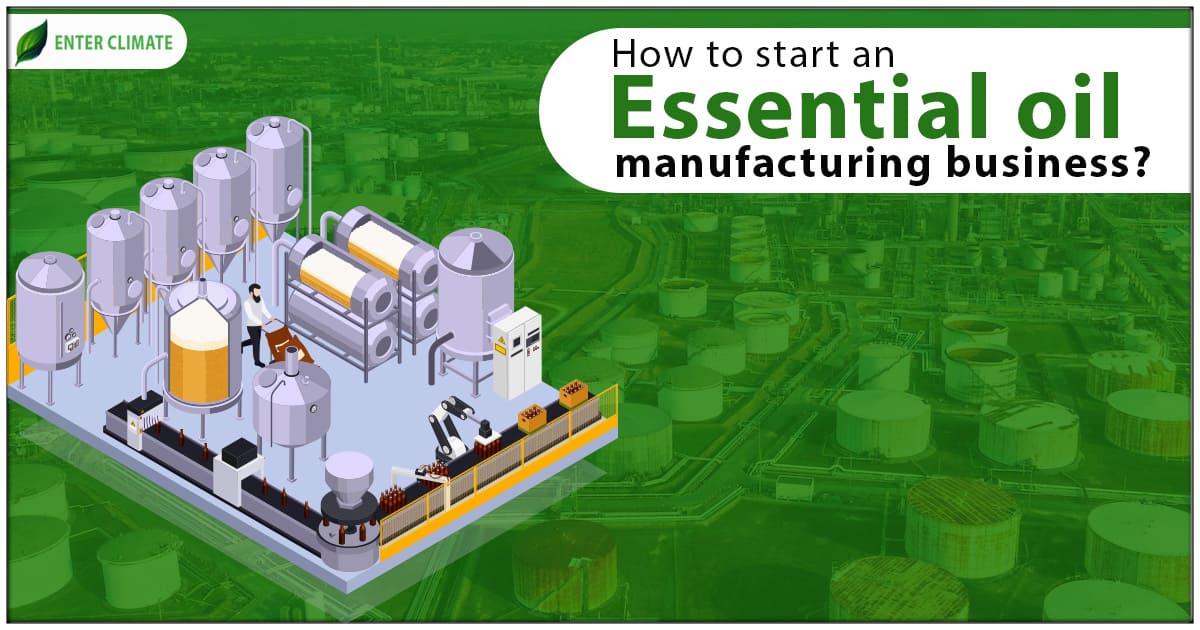How to start an Essential oil manufacturing business?
 13 Jun, 2023
13 Jun, 2023 
Essential oils are concentrated hydrophobic liquids extracted from various plant sources using distillation methods. The market offers multiple essential oils, including orange, lemon, peppermint, corn mint, citronella, spearmint, clover leaf, and eucalyptus. These oils are used in different food and beverage products to add aroma. Additionally, essential oils find applications in personal care and cosmetics due to their beneficial properties, such as antibacterial, antifungal, antiseptic, healing, and anti-inflammatory properties. Essential oils are also employed as alternative preservatives and a method for controlling pathogens, often forming edible films in packaged food items. The success of the Essential oil manufacturing business depends on factors like your experience, knowledge about the different products and training in the field of extraction of oils. However, if you possess an interest or expertise in this sector, it can be a lucrative sector to venture into.
Steps to Start an oil manufacturing business
The manufacturing process of essential oils is crucial as it significantly impacts the final oil product. Distillation is the most widely used and cost-effective method for producing essential oils. It involves converting the volatile liquid (essential oils) into vapour and then condensing it into liquid form. Different types of distillation methods are employed, including water distillation, steam distillation, and hydro diffusion. The steps involved in this business are as follows: –
- Enhance Your Knowledge for Improved Performance
To excel in the essential oil manufacturing business, you must thoroughly educate yourself on the subject matter. Invest time in comprehensive research, exploring various sources online and offline that provide valuable insights into establishing your own oil refining or distillation enterprise.
- Conduct Extensive Research on Licenses and Permits
Before making any decisions, gathering as much information as possible is essential. Familiarize yourself with the licensing and permit requirements specific to your area and the central, state, and local regulations governing oil manufacturing businesses. It is advisable to collaborate exclusively with experts and consultants on this subject.
3. Seek Guidance from Experienced Individuals
Connect with professionals in your field who own their essential oil manufacturing business or operate in a related sector. Reaching out to individuals who have successfully established small-scale oil companies is a logical step. Seek their advice, learn from their experiences, and gain valuable insights into initiating your venture.
4. Registration and licenses
The Registration and licenses must be done with the following authorities:
- MSME Udyog Aadhar
- Trade License from the local municipal authority
- Consent NOC
- GST Registration
- BIS Certification
- AGMARK certification
- EOAI (Essential Oils Association of India) Registration
- Fire NOC
- FSSAI License1
- Acquire the Necessary Essential Oil Manufacturing Equipment
Once you have grasped the foundational information, the subsequent step in your essential oil manufacturing business plan is to procure the equipment required for oil extraction. This entails acquiring machinery such as vacuum distillers and hot water machines. During your equipment search, keep in mind that prices may vary based on the type of equipment, the source of purchase, and the scale of your intended business.
6. Establish a Small-Scale Laboratory
After setting up your equipment, establish a small laboratory, following the principles of starting small but thinking big, as is customary for any business. A laboratory is essential to optimize your equipment usage and ensure high-quality output. Setting up a laboratory is a relatively straightforward and cost-effective process. You will require internet access, a phone, and some essential equipment. You can consider renting specific equipment to kick-start your operations promptly.
7. Grasp the Fundamentals of the Essential Oil Market
To succeed in the essential oil manufacturing business, gaining a comprehensive understanding of the oil extraction processes and the dynamics of the oil market is crucial. Familiarize yourself with the various stages and stakeholders that influence the final product you can produce. This knowledge will equip you with valuable insights for navigating the market effectively.
8. Stay Updated on Essential Oil Advertising Strategies
A successful business in this industry requires knowledge of effective oil marketing strategies. Learn about the marketing tactics employed in the oil market, including product promotion, advertising new oil products, and staying informed about oil company news. Utilizing these marketing tactics will help increase sales of the products you offer.
9. Comprehend the Purposes and Applications of Essential Oils
Explore the industrial, medical, or chemical processes required in starting an essential oil manufacturing business. Additionally, familiarize yourself with oil purification, refinement techniques, and the overall development of oils. Valuable information on these topics can be found on the internet.
10. Identify Suitable Customers Through Online Channels
Once your operations are established, your priority should be identifying and reaching out to potential customers. Several avenues can facilitate this, such as posting sign-up sheets in local stores, advertising in newspapers and magazines, or sending personalized notes to prospects. Utilize the power of the internet to find and engage with the right target audience for your products.
Conclusion
Essential oil manufacturing has emerged as a major application segment with a significant volume share in the food and beverage industry. Their use in this sector is expected to grow at a rapid pace from 2020 to 2027. The increasing demand for natural, safe, and minimally processed food products worldwide has expanded the application scope of essential oils in this industry. The antimicrobial properties of these oils help preserve food and beverages for longer periods, and the focus of manufacturers on extending product shelf life without compromising quality is driving the growth of this segment. By comparing the specifications of each piece of equipment with your requirements and noting down the pros and cons, you can make an informed decision. Seeking assistance from licencing and start-up consultants who can help in giving the appropriate structure to your essential oil manufacturing business and help you with the paper works and legal compliances.
FAQ
What are Essential Oils?
Essential oils are concentrated liquids containing volatile organic compounds that are found in plants. They are also known as volatile, aromatic, or perfume oils. These oils are obtained by extracting the volatile oil from plants through methods such as steeping or steam distillation.
What are the Different Types of Essential Oils?
There is a wide variety of essential oils available, including Lavender, Rosemary, Chamomile, Tea Tree, Hyssop, Grapefruit, Lemongrass, Peppermint, Cedarwood, Sandalwood, Lemon, Bergamot and Marjoram.
What are the Benefits of Essential Oils?
The benefits of essential oils are extensive and have a wide range of applications. They generally do not cause adverse side effects or reactions. Essential oils can help reduce stress, increase energy levels, and promote an overall sense of well-being. When applied topically, they can provide various benefits.
What is the benefit of the Essential oil manufacturing business?
By operating an essential oil manufacturing business, you can contribute to meeting this increasing demand and provide customers with high-quality, natural alternatives to synthetic products. The global market for essential oils is experiencing significant growth, driven by the expanding consumer interest in natural and holistic approaches to health and wellness. By manufacturing and promoting the use of essential oils, you can contribute to the development of natural and sustainable products that positively impact the environment and people’s health.
What are the Registration and licenses required for the Essential oil manufacturing business?
The Registration and licenses must be done with the following authorities:
- MSME Udyog Aadhar
- Trade License from the local municipal authority
- Consent from FSSAI
- GST Registration
- Apply for BIS Certification
- AGMARK certification
- EOAI (Essential Oils Association of India) License
- Fire License
- FSSAI License
Read our Article:How To Start Raw Agro Residue Business- Briquette And Pellets Manufacturing?













